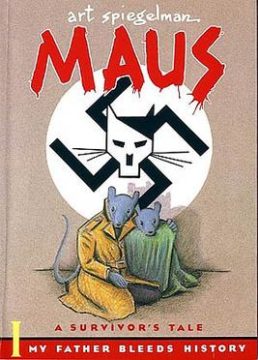Rachel Cooke at The Guardian:
 Spiegelman, as it happens, appears in the most interesting piece in the book: a Q&A with the writer David Samuels from 2013. If Samuels, who prefers to make mini-speeches than to ask to-the-point questions, comes off like a bit of jerk, Spiegelman is ever zippy and contrarian, carefully explaining that, for him, being Jewish means carrying on the traditions of the Marx Brothers and the cartoonist Harvey Kurtzman (in a poll, most Jewish Americans had said it meant remembering the Holocaust). He’s fascinating about the creation of the state of Israel – and seemingly uninterruptible on the subject, even by Samuels. But elsewhere, our celebrated author hardly exists; his narrative has taken on a life of its own. Turning the collection’s pages, I was brought back to my student days, when the dead hand of critical theory threw a black polo neck over even the most enjoyable of texts, shrouding them in darkness. Maus tells the worst story of all; at moments, it’s almost unbearable. Yet its very existence is a kind of light, extraordinary and transfiguring. This may be something the contributors to Maus Now are apt to forget.
Spiegelman, as it happens, appears in the most interesting piece in the book: a Q&A with the writer David Samuels from 2013. If Samuels, who prefers to make mini-speeches than to ask to-the-point questions, comes off like a bit of jerk, Spiegelman is ever zippy and contrarian, carefully explaining that, for him, being Jewish means carrying on the traditions of the Marx Brothers and the cartoonist Harvey Kurtzman (in a poll, most Jewish Americans had said it meant remembering the Holocaust). He’s fascinating about the creation of the state of Israel – and seemingly uninterruptible on the subject, even by Samuels. But elsewhere, our celebrated author hardly exists; his narrative has taken on a life of its own. Turning the collection’s pages, I was brought back to my student days, when the dead hand of critical theory threw a black polo neck over even the most enjoyable of texts, shrouding them in darkness. Maus tells the worst story of all; at moments, it’s almost unbearable. Yet its very existence is a kind of light, extraordinary and transfiguring. This may be something the contributors to Maus Now are apt to forget.
more here.
